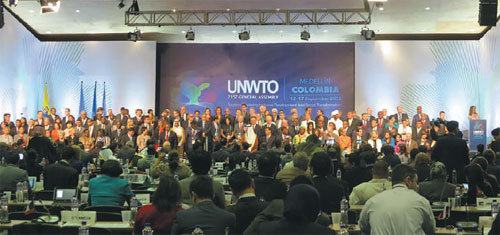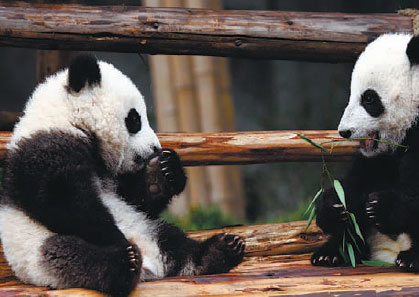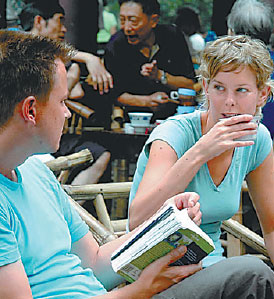Laid-back Chengdu peps up for UN summit
For more than three years, American James Ayala has worked at the Chengdu Research Base of Giant Panda Breeding in Sichuan province. And he has no plan to leave the home of some 150 pandas in the foreseeable future.
Colleague Luo Li, a veterinarian at the base, said Ayala could be mistaken for a Chengdu native because he enjoys the city and its lifestyle so much.
Ayala, the base's only full-time foreign employee, admitted he is in love with the laid-back Chengdu lifestyle known for its picturesque teahouses, hot pot and spicy foods. The 40-year-old especially likes the spicy tofu at Chen Mapo Tofu Restaurant near his house, which he visits at least once a week.
His story is one of many from foreign visitors who have fallen for Chengdu, an inland city in Southwest China. The growing number of overseas tourists helped the city win the right to host the 22nd General Assembly of the United Nations World Tourism Organization.
In recent years, the number of overseas visitors to Chengdu has risen by an annual average rate of 12 percent. In 2014, Chengdu received 180 million visitors, nearly 2 million of whom came from foreign countries.
During its 21st General Assembly held in Medellin, Colombia, on Sept 15, the UNWTO approved Chengdu as the host for the 22nd General Assembly in 2017.
The UNWTO, the world's most influential intergovernmental international tourism organization, is aimed at steering governments of member countries to develop tourism and boost economic and social development.
The UNWTO has 156 full member countries, six associate members and more than 400 affiliate members. The General Assembly is its principal gathering and meets every two years to debate topics of vital importance to the tourism sector.
China joined the UNWTO in 1983 and has participated in each session of the General Assembly since then. The General Assembly has only convened in China once, when the conference was held in Beijing in 2003.
That the UNWTO granted Chengdu the right to host the General Assembly shows its confidence in Chengdu, said Liu Qiang, chief of the Chengdu Tourism Administration. He added that the city will try its best to turn the General Assembly into a success.
'City of Gastronomy'
The city was named the best tourism city of China by the National Tourism Administration and the UNWTO. It has also been named a "City of Gastronomy" by UNESCO. In January, the New York Times called it one of the "52 places to go in 2015".
For many overseas visitors, the most attractive place in Chengdu is the panda base.
Established in 1987 to save hungry and sick pandas rescued from the wild, the base is located in Futou Hill in the northern suburbs of Chengdu.
While some overseas visitors spend a whole day observing pandas, an increasing number of Chinese visitors are drawn there, too, for the vast expanse of bamboo forests and black swans swimming in a nearby lake.
Overseas visitors who are interested in Chinese history and culture may enjoy the Temple of Marquis Wu, Du Fu Thatched Cottage Museum and the Jinsha Site Museum.
The Temple of Marquis Wu is dedicated to Zhuge Liang, the personification of wisdom and loyalty in China.
More than 1,800 years ago, China was divided into three kingdoms. As the three vied for national reunification, they were locked in constant battles, resulting in the The Romance of Three Kingdoms, one of China's four classical novels.
Zhuge Liang helped Liu Bei, a warlord, to build the Shu Kingdom in Sichuan. Thanks to Zhuge, Shu, the weakest of the three, went on to dominate the land.
The Du Fu Thatched Cottage Museum is one of the most sacred lands in Chinese literature.
A native of Gongxian, Henan province, Du is an icon in Chinese literature for his masterpieces that retell the hardships that the war-torn motherland and its people experienced.
Du lived in Chengdu for nearly four years as a refugee after two rebel generals revolted in AD 755 and brought the illustrious Tang Dynasty (AD 618-907) to an end.
With the help of an official friend, Du had a thatched cottage built in the western suburbs of Chengdu where he spent a tranquil life, penning some 200 of his 1,400 poems.
After a windstorm destroyed his cottage, Du wrote he would die content if all the poor scholars would have decent buildings to shelter them. The lines he wrote have been passed on in textbooks for Chinese students from one generation to another.
Mount Qingchen, the birthplace of Taoism, and the Dujiangyan Irrigation Project, the world's oldest irrigation project that is still in operation, are also located in Chengdu. Qingcheng and Dujiangyan are on the UNESCO World Cultural Heritage List.
The city has more than 5,000 hotels. Shuangliu International Airport in Chengdu has 247 routes and links 71 overseas cities and regions.
Fifteen countries have set up consulate generals in Chengdu, including the United States, Germany, France, Thailand, Korea, Singapore, Pakistan and the Philippines.
A total of 268 Fortune 500 firms have invested in Chengdu. The number of Fortune 500 firms ranks first in the central and western parts of China.
Decision-makers in Chengdu hope hosting the UNWTO General Assembly casts a favorable light on the city and attracts more visitors and investors.
huangzhiling@chinadaily.com.cn
|
The UNWTO approved Chengdu as the host for its 22nd General Assembly in 2017 during a conference in Medellin, Colombia, on Sept 15. Photos Provided to China Daily |
|
Chengdu's panda research base is an attractive tourist destination. |
|
The city is known for its laid-back lifestyle and picturesque teahouses. |
(China Daily 09/23/2015 page7)

















